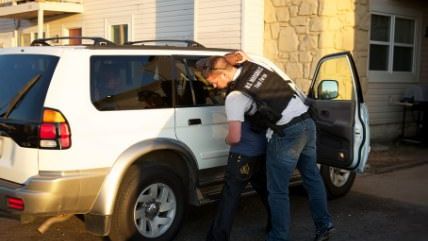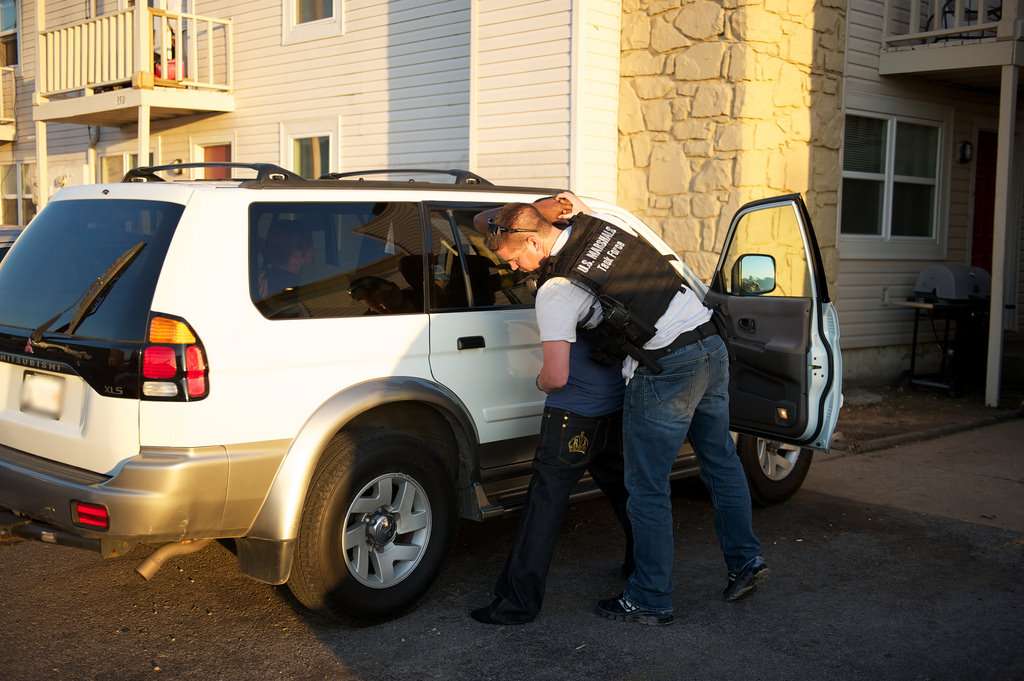Ohio Legislators Look to Require Criminal Convictions Before Seizing Assets
Police, prosecutors resist changes.


A pack of Republican members of Ohio's House are taking on police and prosecutor interests by introducing legislation this week that would eliminate civil asset forfeiture in the state. Police would still be able to seize and keep money and property, but they'll have to land a conviction first. From the Columbus Dispatch:
State Rep. Rob McColley, R-Napoleon, a prime sponsor of the bill, said he is not alleging any specific abuse in Ohio. But when a law allows the state to take people's property without a conviction, it's an "affront to one of our country's most-basic principles of justice: that people are innocent until proven guilty."
The bill does not affect law enforcement's ability to seize evidence, McColley said. It would bar forfeiture of property to the state without a conviction. Also, for assets to be held during a criminal proceeding, the bill would require the state to prove that the property is subject to forfeiture.
Here's what a prosecutor had to say about it:
John Murphy said he is well aware of the horror stories, but the executive director of the Ohio Prosecuting Attorneys Association said Ohio law protects against those kinds of problems and does not need to be changed.
The process is supervised by the courts, and the taking of property cannot be out of proportion with the nature of the offense, Murphy said.
"We're being tagged with the sins of others," he said.
And here's why Murphy is full of crap. Yes, according to the property-protecting folks of the Institute for Justice, Ohio actually does have pretty good asset forfeiture laws, requiring a higher threshold of proof than some other states and not feeding the proceeds from civil asset forfeiture back to local police departments, thus avoiding some twisted financial incentives.
The problem, though, is that Ohio doesn't have anything preventing its law enforcement agencies from partnering with the Department of Justice to use its Equitable Sharing forfeiture program to seize property under much looser guidelines and keep the money and assets for themselves in defiance of state regulations. That's exactly what Ohio law enforcement agencies have done, getting more than $80 million this way between 2000 and 2008.
Under McColley's bill, cash seizures could not be made through the federal asset forfeiture program unless the value exceeded $50,000. This is important because while law enforcement representatives like to suggest they're using asset forfeiture to fight major drug dealers, in reality the average asset forfeiture value is just a few thousand dollars. In the event that Ohio police actually do make a major drug bust, they'll still be able to participate in the sharing program.
Oh, and despite insisting they're being tagged with "the sins of others," a reminder about Ohio's absurd behavior in fighting the war on drugs: This is the state that outlawed customizing your own vehicle to put in secret compartments.
Editor's Note: As of February 29, 2024, commenting privileges on reason.com posts are limited to Reason Plus subscribers. Past commenters are grandfathered in for a temporary period. Subscribe here to preserve your ability to comment. Your Reason Plus subscription also gives you an ad-free version of reason.com, along with full access to the digital edition and archives of Reason magazine. We request that comments be civil and on-topic. We do not moderate or assume any responsibility for comments, which are owned by the readers who post them. Comments do not represent the views of reason.com or Reason Foundation. We reserve the right to delete any comment and ban commenters for any reason at any time. Comments may only be edited within 5 minutes of posting. Report abuses.
Please to post comments


I give 4:1 odds against it actually becoming law.
10:1 odds against it becoming law without gaping, drooling loopholes.
Agreed and ew.
Even if it becomes law, what's to stop the cops from ignoring it? It's not like it will contain penalties for cops who steal peoples' shit, and any victim of their theft will have to spend a few grand on a lawyer to get their stuff back. So I don't see anything changing.
Sadly, I think you're right. Unless there's some kind of incentive not to steal peoples' shit, statists will keep on stating.
One nice thing about my state is that all fines and forfeitures go into the state's general fund. Municipalities don't get a dime. So you very rarely see speed traps or cops seeking out people to rob.
As a fellow Mitsubishi Montero owner, I really feel for the person in the picture.
Just kidding--I feel nothing.
That shitty resale value is enough to suck the humanity out of anyone.
It's true. I figured when I bought it, I'd just drive it until either it or I died.
Here's an oldie but goodie from Ohio civil forfeiture history.
Nothing bad that happens to Corey Blount (or Nick Van Exel or Bob Huggins) will ever make me sad. In fact, that story almost makes me now support civil forfeiture laws.
- Memphis State (Penny Hardaway era) alumni
Well, if it already protects against these kinds of problems - then the law won't affect anything and so there's no reason to worry about its passing.
What is disheartening is that this is one of those issues you would think would be a no brainer. You would think that as a politician it would be easy to jam this through.
Or am I really that out of touch and the general public really does think that these are good laws/ideas because drugs are so bad?
The general public thinks "asset forfeiture" is what happened to that guy who owned the LA Clippers.
One of my Facebook friends thinks the evil Republicans are doing this so the Public Utilities Commission can't take property from criminal electric companies.
am I really that out of touch and the general public really does think that these are good laws/ideas because drugs are so bad
You are out of touch if you think what the public wants outweighs what the police-industrial complex wants, yes.
am I really that out of touch and the general public really does think that these are good laws/ideas because drugs are so bad
You are out of touch if you think what the public wants outweighs what the police-industrial complex wants, yes.
If everyone were to stop cooperating with every investigation and just said fytw back to them things could change. Not gonna happen though.
"Police, prosecutors resist changes."
Which exposes them for what are. Thieves.
Simple, direct wording is sometimes the most effective wording.
I make up to $90 an hour working from my home. My story is that I quit working at Walmart to work online and with a little effort I easily bring in around $40h to $86h? Someone was good to me by sharing this link with me, so now i am hoping i could help someone else out there by sharing this link... Try it, you won't regret it!......
http://www.HomeJobs90.Com
For those here who hadn't noticed, that is the way the thing is supposed to work. By the bye, 2 + 2 still equal 4, don't they?